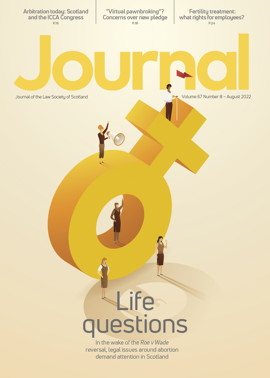Family: CGT reforms in the pipeline
Many family lawyers will be familiar with the scenario of frantically trying to deal with asset transfers by 5 April in any given year. The current tax position (Taxation of Chargeable Gains Act 1992, s 58), in which a transfer of assets between separated spouses is neutral for capital gains tax (“CGT”) purposes provided that the transfer takes place within the same tax year as the parties’ separation, can make it nigh-on impossible for a couple who separate close to the end of the tax year to avoid exposure to CGT. Currently, if a separated couple do not manage to achieve any such transfer between themselves within the tax year of their separation, the transfer is deemed to have taken place for market value, potentially resulting in a liability to CGT.
Another feature of the current legal position is that, where one of the spouses has moved out of the family home on separation, his or her principal private residence (“PPR”) relief only applies for nine months following their departure. If the property is sold more than nine months after that party has moved out, PPR no longer applies to that party’s share, again giving rise to the possibility of a CGT bill.
Against that backdrop, the draft Finance Bill 2022-23, published on 20 July 2022, is to be welcomed. This bill is intended to implement the recommendations of the Office of Tax Simplification (“OTS”) to the effect that the “no gain, no loss” window affecting separated couples should be extended. In fact, the draft legislation goes somewhat further than the OTS’s recommendations.
“No gain, no loss” period
The bill provides for extension of the “no gain, no loss” period to either three years after the end of the tax year in which the parties cease to live together, or – where the parties are transferring assets pursuant to a court order – the whole period up to the point of transfer. In other words, where assets are to be transferred pursuant to a court order, there will be no time limit applicable to the “no gain, no loss” period. It is to be hoped that in Scotland, where assets are much more commonly transferred by virtue of a minute of agreement than a court order, HMRC will treat a Scottish minute of agreement in the same manner as an English consent order for these purposes.
PPR relief
At present PPR relief ends after nine months for a spouse moving out of the family home, but the draft legislation provides that relief shall apply to the full period of the non-occupying spouse’s ownership of the property, provided that the sale and that party’s absence from the property have been due to the parties’ separation/divorce.
Deferred charge arrangements
At the moment, when a party enters into a deferred charge over the parties’ main home, that charge is a new asset for CGT purposes, and when the charge is paid the increase in value is subject to CGT. The new legislation enables the party in whose favour the security has been granted to claim PPR relief on that gain and thereby reduce the liability
to nil.
Transitional provisions?
The bill provides that it will apply to transfers which take place from 6 April 2023 onwards. Presumably, a couple who separate during the tax year 2023-24 will, in terms of the new legislation, have until 5 April 2027 to transfer assets between them without incurring any immediate CGT liability (unless this is being done subject to a court order, in which case no time limit will apply). But what about couples who had already separated prior to the new legislation coming into force? Will these provisions apply to them too? If a couple separated in January 2022, in terms of the current position they would have had to transfer assets between themselves by 5 April 2022 in order to avoid potential exposure to CGT. If they have missed that window, will the new legislation mean that they can instead wait
until 6 April 2023 and then transfer their assets on a “no gain, no loss” basis?
Time to comment
It must be remembered that this legislation is currently in draft only and may therefore not make it to the statute book in its present form. Professional bodies, and others, are invited to comment (until 14 September 2022) on the draft legislation and whether it serves its intended purpose, but it certainly appears to address what is currently a rather unfair and unrealistic set of time limits affecting separating couples.
Regulars
Perspectives
Features
Briefings
- Criminal court: Long road against addiction
- Family: CGT reforms in the pipeline
- Employment: Long COVID as a disability
- Human rights: civil rights not engaged by legal aid bid
- Pensions: A neverending story – fraud update
- Scottish Solicitors' Discipline Tribunal: August 2022
- Property: The RoS arrear: any light in the tunnel?
- In-house: As the workplace evolves






